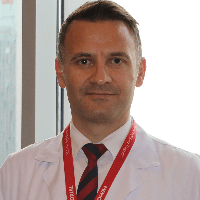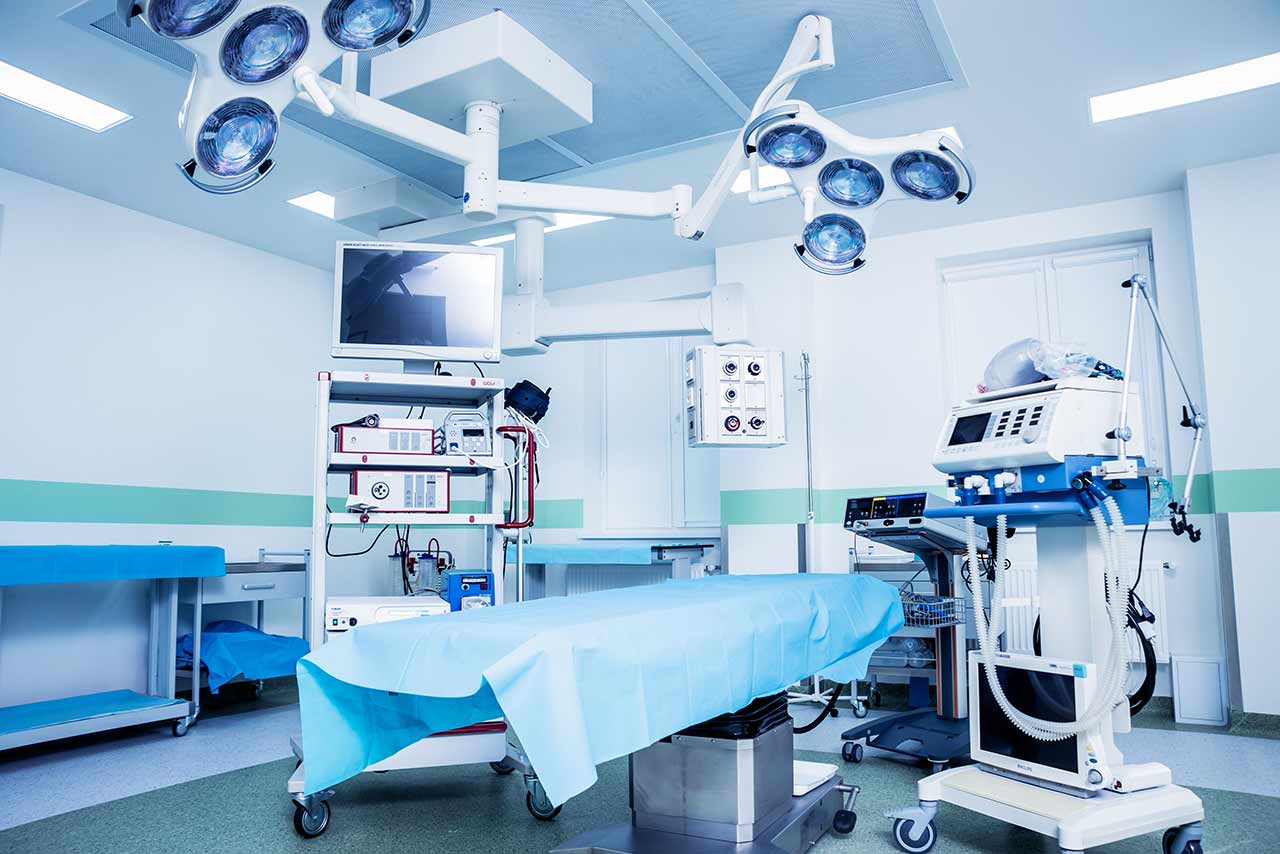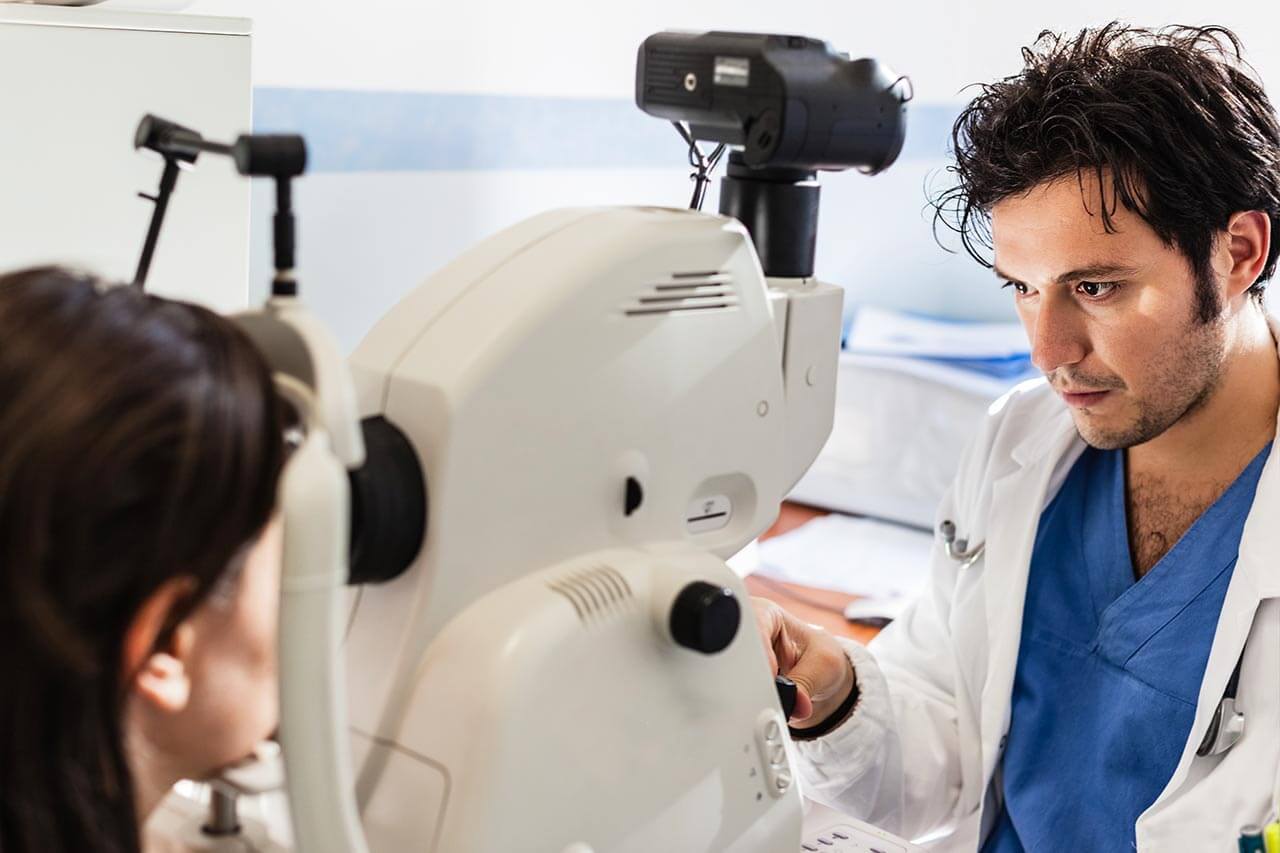
The program includes:
- Initial presentation in the clinic
- clinical history taking
- review of medical records
- physical examination
- ophthalmological examination:
- slit lamp examination
- pupil examination
- ocular motility examination
- ophthalmoscopy
- perimetry (visual field test)
- computer perimetry
- visometry (without correction and with correction)
- keratometry
- pachymetry
- refractometry (objective, subjective, cycloplegic)
- autorefractometry
- non-contact tonometry
- fluorescein angiography (if indicated clinically)
- optical coherence tomography OCT (if indicated clinically)
- gonioscopy
- photokeratoscopy
- doppler ultrasound of the retinal vessels
- nursing services
- services of chief physician and all leading experts
- explanation of individual treatment plan
Required documents
- Medical records
- Optical coherence tomography (if available)
Service
You may also book:
 BookingHealth Price from:
BookingHealth Price from:
About the department
The Department of Adult and Pediatric Ophthalmology at the Memorial Ankara Hospital offers the high-precision diagnostics and treatment of the full range of eye diseases – from inflammatory processes to severe types of refractive errors and malignancies. The department's specialists develop an individual treatment regimen for each patient, while the preference is given to the most effective and sparing treatment methods, which allow the patient to get rid of the painful symptoms as quickly as possible and restore good vision. Depending on the nature of the pathology and its stage, the therapeutic offer includes drug therapy, laser correction, microsurgical interventions or other procedures. The highest professionalism of the department's medical team guarantees successful results even in particularly complex clinical cases. The department is headed by Prof. Dr. med. Koray Gümüş.
The excellent technical equipment is one of the keys to achieving optimal treatment results. The department's ophthalmologists perform such examinations as tonometry, autorefractometry, biomicroscopy, optical coherence tomography, slit lamp exam, visual field testing and many others. These tests allow the doctor to establish an accurate diagnosis even at the initial stages of pathological changes in the eye, during which the symptoms are absent or mild.
If possible, the doctors provide the conservative treatment, laser correction of visual impairments. For example, in the case of glaucoma, it may be medications for normalizing intraocular pressure, in the case of retinal degeneration – angiogenesis inhibitors, etc. To correct strabismus, amblyopia, and refractive errors, the doctors use special lenses, select glasses, and prescribe computer exercises. In the advanced types of eye diseases, the conservative methods can often be ineffective, so the doctors resort to surgical interventions. Thanks to the availability of the cutting-edge instruments for sparing minimally invasive interventions, the patient can recover from the operation as soon as possible, and the operational risks are practically reduced to zero.
The department's service range is not limited to the medical care for adult patients – children, including the youngest ones, can also be diagnosed and treated here. The babies undergo vision screening at the age of 1-2 months, then at the age of 1 year and up to 3 years. The most common pathologies in children are retinopathy of prematurity, congenital cataract, glaucoma, and strabismus.
The department's range of medical services includes:
- Diagnostics and treatment of cataract
- Diagnostics and treatment of glaucoma
- Diagnostics and treatment of refractive errors (myopia, hyperopia and astigmatism)
- Diagnostics and treatment of keratoconus
- Diagnostics and treatment of retinal detachment
- Diagnostics and treatment of macular degeneration
- Diagnostics and treatment of uveitis
- Diagnostics and treatment of diabetic retinopathy
- Diagnostics and treatment of eyelid diseases (for example, ptosis, ectropion and entropion, eyelid tumors, etc.)
- Diagnostics and treatment of pathologies of the lacrimal passages
- Diagnostics and treatment of traumatic injuries of the eye and its appendages
- Diagnostics and treatment of pediatric ophthalmic diseases (retinopathy of prematurity, congenital cataract and glaucoma, strabismus)
- Diagnostics and treatment of other ophthalmic diseases in adults and children
The department specializes in the following treatments:
- Refractive eye surgery (PRK, LASIK, LASEK, FLEX, SMILE)
- Eye microsurgery
- Eye sclerotherapy
- Vitrectomy
- Intraocular injection
- Eyelid, lacrimal tract and orbital surgery
- Intraocular lens implantation
- Cancer surgery of the eye and its appendages
- Other treatment methods
Photo of the doctor: (c) Memorial Ankara Hospital
Curriculum vitae
Professional Career
- Since 2019 Chief Physician of the Department of Adult and Pediatric Ophthalmology at the Memorial Ankara Hospital, Ankara, Turkey.
- 2005 - 2019 Work as Ophthalmologist, hospital at the Erciyes University, Kayseri, Turkey.
Higher Education and Postgraduate Training
- 2015 - 2016 Postdoctoral studies, Baylor College of Medicine, Houston, TX, USA.
- 2009 - 2010 Postdoctoral studies, Baylor College of Medicine, Houston, Texas, USA.
- 2000 - 2004 Professional training in Ophthalmology, Faculty of Medicine, Hacettepe University, Ankara, Turkey.
- 1994 - 2000 Study of Human Medicine, Faculty of Medicine, Hacettepe University, Ankara, Turkey.
Awards and Honors
- 2015 Research Award, Gazi Eye Foundation, Turkish Ophthalmological Association (TOD), Istanbul, Turkey.
- 2012 Poster Award, European VitreoRetinal Society, Nice, France.
- 2010 Award of the Tear Film and Ocular Surface Society (TFOS).
- 2004 38th TOD National Congress of Ophthalmology, 3rd place in the category "Award for Best Research".
- 2000 Prof. Ihsan Dogramaci Award for Outstanding Achievements.
- 1999 "Student of the Year" Award.
Memberships in Professional Societies
- American Academy of Ophthalmology (AAO).
- Association for Research in Vision and Ophthalmology (ARVO).
- International Ocular Surface Society (IOSS).
- European Society of Cornea & Ocular Surface Disease Specialists (EuCornea).
- Turkish Ophthalmological Association.
- Turkish Republics Ophthalmology Association (TCOD).
- Turkish Medical Association.
- Hacettepe University Faculty of Medicine Alumni Association.
About hospital
The Memorial Ankara Hospital is one of the largest private medical complexes in the capital of Turkey, where patients can undergo top-class diagnostics and treatment in all fields of modern medicine. The hospital is part of the prestigious Memorial Healthcare Group. The doors of the medical facility were first opened in 2014, and since then its employees have been doing their best to maintain the credibility of the hospital both throughout the country and far beyond its borders. For exceptional medical service, the hospital was awarded the Joint Commission International (JCI) certificate, which is given only to the best medical centers around the world.
The hospital is located in a modern building with an area of 42,000 square meters. The medical facility has 230 beds for the accommodation of patients. It includes 63 specialized departments – each of them specializes in a particular medical field. The key focuses are ophthalmology, plastic surgery, cardiology, cardiac surgery, orthopedics and oncology.
The hospital includes 11 modern operating rooms. They use special LED lamps, which prevent thermal emission and comply with the international sterilization technologies. The hospital also has hybrid operating rooms, which are equipped for minimally invasive operations.
Special attention should be given to the medical and technical base of the medical complex. It includes state-of-the-art diagnostic devices for MRI, CT, PET-CT, as well as TrueBeam STx and Elekta Versa HD radiation therapy devices, and many other innovative systems, which guarantee the patient the most effective results and maximum comfort.
Naturally, the medical staff of the medical facility also plays a key role in the successful clinical practice. The health of the patients is in good hands of the highly qualified doctors who have comprehensive professional training, many years of experience and regularly demonstrate excellent treatment results. The responsive nursing staff provides patients with quality care. In addition, all the staff of the hospital show a friendly and respectful attitude towards the patients.
Photo: (c) depositphotos
Accommodation in hospital
Patients rooms
The patients of the Memorial Ankara Hospital live in cozy single rooms and luxury rooms. Each patient room has all the amenities for maximum comfort. The hospital also has specially equipped rooms to accommodate disabled patients. The patient rooms are equipped with all necessary furniture, TV, telephone, ensuite bathroom with shower and toilet. The patient rooms also have Wi-Fi. The rooms are designed in a pleasant light color scheme, while the large panoramic windows offer a beautiful view of the capital of Turkey.
Meals and Menus
The patient and the accompanying person are offered tasty and balanced three meals a day. If for some reason you do not eat all foods, you will be offered an individual menu. Please inform the medical staff about your food preferences prior to treatment.
Further details
Standard rooms include:
Accompanying person
During the inpatient program, the accompanying person can live with the patient in a patient room or a hotel of his choice. Our managers will help you choose the most suitable option.
Hotel
During an outpatient program, the patient can stay at the hotel of his choice. Our managers will help you choose the most suitable option.




